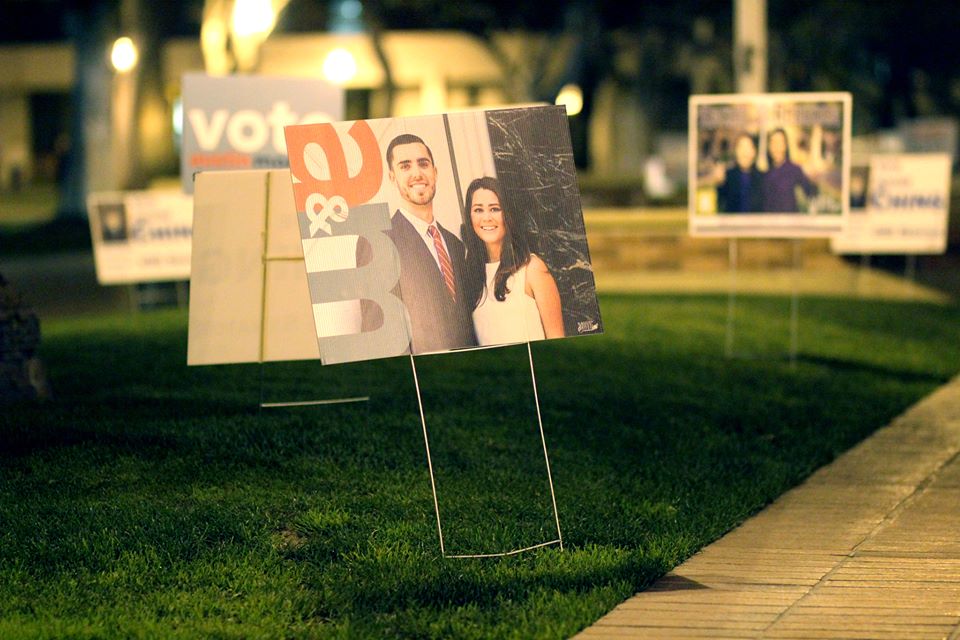USG campaign sanctioned after elections hearing
The Undergraduate Student Government Elections Commission administered two strikes to Austin Dunn and Morgan Monahan’s presidential campaign after the other two tickets filed complaints, according to transcripts from elections hearings released Tuesday.
The verdict from the hearings, which took place Sunday, stated that the Elections Commission unanimously banned the campaign from posting on social media for a 48-hour period. The social media ban, according to the Elections Commission, includes but is not limited to Facebook, Twitter or Instagram posts by the candidates and their team on their personal accounts. The sanctions became effective Monday at 12:01 a.m. and remained in effect until 11:59 p.m. Tuesday. Furthermore, the two strikes will count toward a nine-strike limit, at which point the ticket would be disqualified, according to the USG Elections Code.
Dunn, a junior majoring in political science and pursuing a master’s in public diplomacy, and Monahan, a junior majoring in business administration, announced their candidacy for president and vice president, respectively, on Jan. 26 at 7 p.m. However, the other two tickets — consisting of Rachel Udabe and running mate Rebecca Harbeck and current USG Senator Daniel Million and running mate Timothy Vorhoff — alleged in complaints filed with the USG Elections Commission on Jan. 27 that Dunn and Monahan had begun their campaigning the day before what was allowed, on Jan. 25 at approximately 11:00 a.m.
In one hearing, Udabe and Harbeck asked the four deciding commissioners to disqualify Monahan and Dunn on the basis that they had broken election codes by creating a Facebook group and inviting several hundred members before the start of the official campaign period. Udabe and Harbeck argued that this put the other two tickets at a disadvantage.
“If they are not disqualified, there is no reason for candidates in the future to not engage in this type of problematic behavior,” Harbeck said at the hearing, according to the transcript. “If you can gain a clear advantage in the beginning without fear of actual punishment to advance your ends, why would other people not do this as well?”
Million and Vorhoff, whose complaint was addressed in the other hearing on Sunday, said that several people invited to join were current members of USG who should not have been involved based on their positions. Furthermore, they added that having a group formed 32 hours before the official start of the campaign period gave Dunn and Monahan’s campaign a strong base of supporters a full day in advance.
“Just based on having over a hundred people added to a secret group, don’t you feel like that would also affect just having people knowledgeable about the election a day ahead of time, don’t you think they could have spread the word to their friends?” Million said at the hearing. “Just having a hundred people, of course they would probably talk to an additional person or two additional people.”
Monahan and Dunn agreed that they had set up the Facebook group on Jan. 25, but stated that initially, they only invited a core group of people who were involved with their campaign to take part in it. However, these people then invited others, which led to the group having over 300 members by Jan. 26, according to the transcript from the hearing.
“This was in no way meant to be a malicious act against the other two tickets,” Monahan said, according to the hearing transcripts. “It was honestly just because we were excited. We’ve been planning this since October.”
However, Dunn added that he believed his team was not the only one to have broken campaign rules.
“We have specific cases from both teams about how they actually announced the campaign before we even did, so we thought that it would be in our best favor if we just slid everything under the rug because we’re all kind of responsible for that,” Dunn said at the hearing, according to the transcript. “And we thought it would kind of be best to move forward from that and have a very clean campaign, but other teams may not have felt that way.”
The three campaign tickets were not allowed to comment on the situation, and the Elections Commission also declined to comment.
This post was updated on Feb. 1 at 12:46 a.m.

